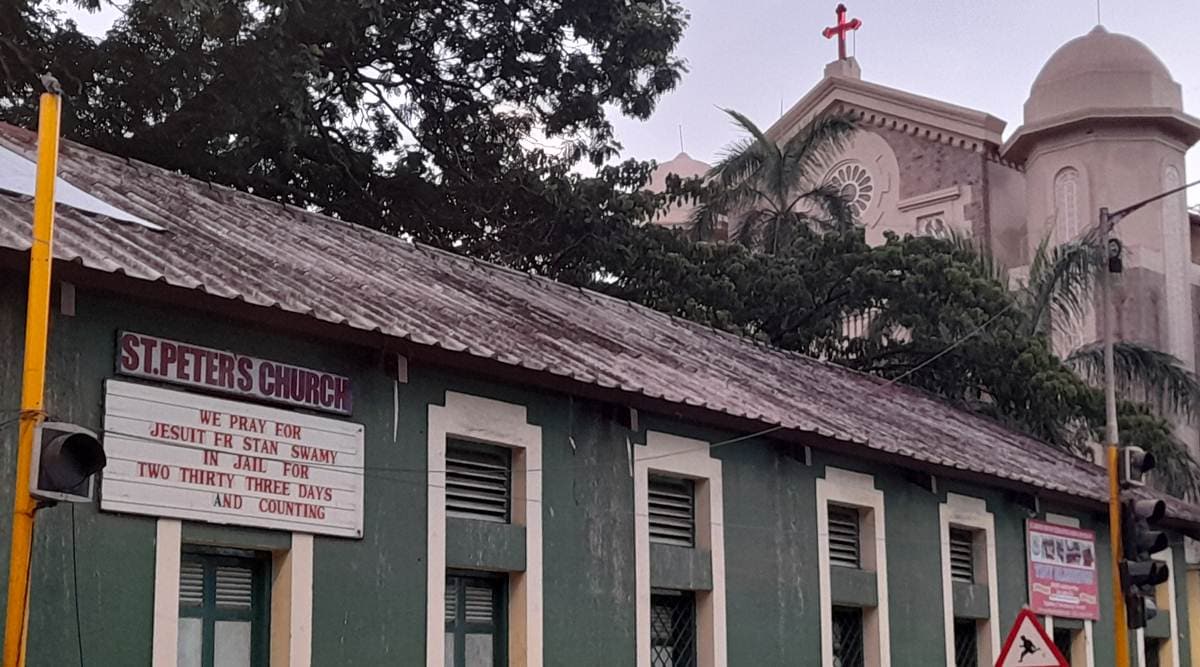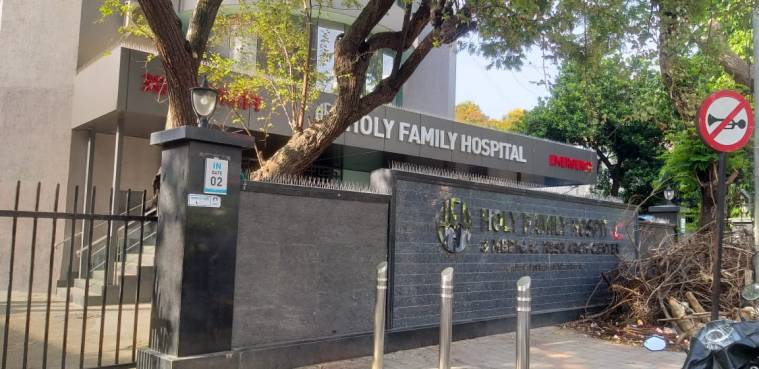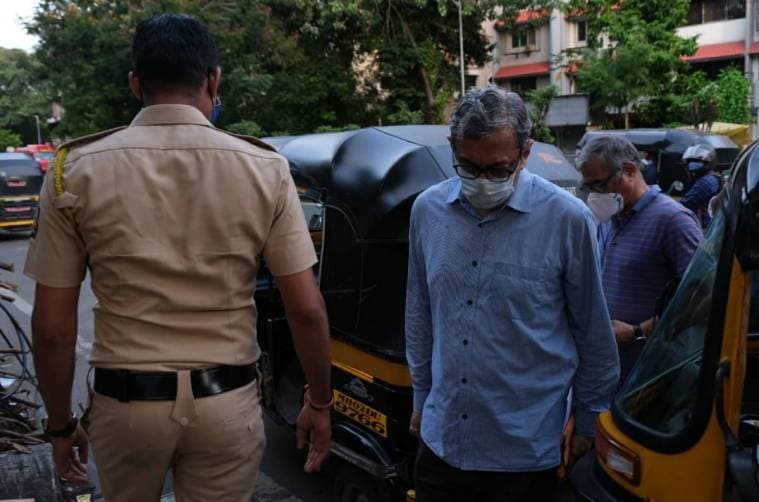 St Peter’s Church, Mumbai, Monday. It has had this board since May 28, when HC ordered Swamy be taken to hospital. (Express photo by Pradip Das)
St Peter’s Church, Mumbai, Monday. It has had this board since May 28, when HC ordered Swamy be taken to hospital. (Express photo by Pradip Das) WHEN THE National Investigation Agency (NIA) summoned Father Stan Swamy to its Mumbai office in October last year, its officials said the Jesuit priest and rights activist, then 83 years old, was to be interrogated further in connection with the Elgar Parishad case.
Swamy was arrested on October 8 and flown to Mumbai the next day, but the central agency did not seek his custody for interrogation. The following day, October 9, the NIA court, where Swamy was produced, sent him to judicial custody in Taloja Central Jail, where he remained until he was shifted to a private hospital on May 28, where he died on Monday.
“What was the need for his arrest as not a single day’s custody was sought?” asked Swamy’s lawyer Mihir Desai before the Bombay High Court on Monday, minutes after the bench was informed of Swamy’s death. Calling for an inquiry, Desai said while he had no complaints against the court or the hospital, he could not say the same about the NIA and jail authorities.
Swamy was first probed in connection with the Elgar Parishad case when the Pune Police searched his home in Ranchi in 2018 and 2019. After the NIA took over the case in January 2020, he was interrogated for nearly 15 hours over five days in July-August. The NIA summoned him again in October last year, this time to its Mumbai office.
 Stan Swamy was admitted to a private hospital since May 30 following the directions of the Bombay High Court. (File Photo)
Stan Swamy was admitted to a private hospital since May 30 following the directions of the Bombay High Court. (File Photo)
On October 9, the day he was produced before the court, the NIA filed a chargesheet against him and seven others, accusing them of being members of the banned organisation CPI (Maoist) and working to further its activities.
The agency, however, did not seek Swamy’s custody for further interrogation but insisted that he be kept behind bars. Within a week of his arrest, when Swamy sought interim bail on the ground that he is susceptible to the Covid-19 infection given his age and comorbidities, including a heart condition and Parkinson’s disease, the NIA said the 83-year-old was taking “undue benefit” of the pandemic and that the pleading about his medical condition was “merely a ruse” to obtain interim relief.
The court rejected his plea on October 22.
Swamy then filed for bail again in November, this time on merits, based on the chargesheet against him.In his 31-page bail plea filed and argued by lawyer Sharif Shaikh, it was submitted on Swamy’s behalf that no purpose was being served “keeping a sick 83-year-old incarcerated”. It was also submitted that the fact that he was not arrested for two years after the FIR was filed in 2018, showed that he was not considered a flight risk or someone who would tamper with evidence.
 Outside Holy Family Hospital. (Express Photo: Ganesh Shirsekar)
Outside Holy Family Hospital. (Express Photo: Ganesh Shirsekar)
As ‘evidence’ of his alleged association with the CPI (Maoist), the NIA told the court there were emails exchanged between Swamy and the other co-accused and claimed that in 2019, he had attended a meeting in Kolkata organised to protest against the arrest of human rights activists in the Elgar Parishad case.
Founder of Bagaicha, a Ranchi-based organisation that works for advisasis and moolvasis, Swamy said he was targetted for protesting against the illegal detention of youngsters accused of being Maoists. He said he has never visited Bhima Koregaon and the documents claimed to have been found on his laptop were in a format which can be “easily manipulated and planted on an insecure digital device”. Even before his arrest, Swamy had questioned the authenticity of the documents when confronted with them, saying that they did not show details of the sender and receiver, and had no date or signature, and thus could be easily planted.
 Father Frazer Mascarenhas outside Holy Family Hospital. (Express Photo: Ganesh Shirsekar)
Father Frazer Mascarenhas outside Holy Family Hospital. (Express Photo: Ganesh Shirsekar)
The court, while rejecting Swamy’s bail plea in March this year, had said that his grounds for seeking relief, including his old age and sickness, “were outweighed by the collective interest of the community”.
While appeals filed before the Bombay High Court on behalf of Swamy against the special court’s orders were pending hearing, the NIA opposed his bail, including on medical grounds, until his death.
In a video recorded by Swamy before his arrest, he said he was reluctant to travel from Ranchi to Mumbai due to his old age, various ailments and the ongoing Covid-19 pandemic. “Now, they (NIA) want to take me to Mumbai for further interrogation which I am refusing to go because of my age. I have certain ailments, there is a pandemic ravaging in the country and Jharkhand government has issued instructions that elderly people may not travel or appear in public. Given these, I do not want to risk myself. On the other hand, I am ready for interrogation that NIA wants but through video-conference,” he had then said. He added that he was hoping that “some human sense will prevail”. “If not, I am ready to face what is next.”
- The Indian Express website has been rated GREEN for its credibility and trustworthiness by Newsguard, a global service that rates news sources for their journalistic standards.

